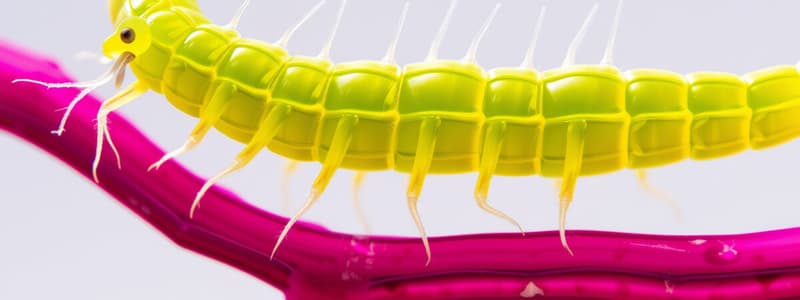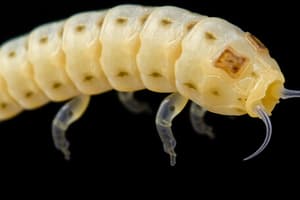Podcast
Questions and Answers
Which parasite is transported by Sandfly?
Which parasite is transported by Sandfly?
- H.nana
- T.solium
- F.buski
- Leishmania (correct)
Leishmania chagasi is found in Sudan.
Leishmania chagasi is found in Sudan.
False (B)
What is H.nana known as?
What is H.nana known as?
Dwarf tapeworm
What is A.lumbricoides commonly known as?
What is A.lumbricoides commonly known as?
What is the largest protozoa?
What is the largest protozoa?
What type of organism is F.buski?
What type of organism is F.buski?
T.solium gravid proglottid has more uterine branches than T.saginata.
T.solium gravid proglottid has more uterine branches than T.saginata.
What is the infective stage of T.saginata?
What is the infective stage of T.saginata?
What is the infective stage of T.solium?
What is the infective stage of T.solium?
The scolex of T.saginata has 4 suckers and a circle of ______.
The scolex of T.saginata has 4 suckers and a circle of ______.
Match the following parasites with their intermediate hosts:
Match the following parasites with their intermediate hosts:
Roman's sign is caused by T.cruzi.
Roman's sign is caused by T.cruzi.
Who are the most important definitive hosts of E.granulosus?
Who are the most important definitive hosts of E.granulosus?
What type of viruses are both herpes virus and pox virus?
What type of viruses are both herpes virus and pox virus?
Which stage is considered the infective stage of G.lamblia?
Which stage is considered the infective stage of G.lamblia?
What is the infective stage of D.latum?
What is the infective stage of D.latum?
The eggs of D.latum hatch in fresh water.
The eggs of D.latum hatch in fresh water.
What is the infective stage of Fasciola hepatica?
What is the infective stage of Fasciola hepatica?
Some of the liver flukes are F.hepatica and ______.
Some of the liver flukes are F.hepatica and ______.
What is the intermediate host of W.bancrofti?
What is the intermediate host of W.bancrofti?
What is the intermediate host of Loa Loa?
What is the intermediate host of Loa Loa?
Loa Loa microfilaria have diurnal periodicity and are unsheathed.
Loa Loa microfilaria have diurnal periodicity and are unsheathed.
What is the best time to detect W.bancrofti in blood samples?
What is the best time to detect W.bancrofti in blood samples?
What is the lifespan of O.volvulus?
What is the lifespan of O.volvulus?
What is the best sample to diagnose O.volvulus?
What is the best sample to diagnose O.volvulus?
Hookworms are classified as true filarial.
Hookworms are classified as true filarial.
What is the infective stage of T.gondi?
What is the infective stage of T.gondi?
T.gondi invades the central nervous system.
T.gondi invades the central nervous system.
What type of organism does Schistosoma belong to?
What type of organism does Schistosoma belong to?
Schistosoma eggs contain an operculum.
Schistosoma eggs contain an operculum.
What causes complications in schistosomal infection?
What causes complications in schistosomal infection?
The adult worm of Schistosoma appears in stool samples.
The adult worm of Schistosoma appears in stool samples.
What is the ring stage of P.falciparum?
What is the ring stage of P.falciparum?
What kind of parasite is Plasmodium?
What kind of parasite is Plasmodium?
What can ICT for malaria detect?
What can ICT for malaria detect?
What is related to the precipitation line thickness of ICT?
What is related to the precipitation line thickness of ICT?
Flashcards are hidden until you start studying
Study Notes
Leishmania and Transmission
- Leishmania parasites are transmitted primarily by sandflies, which invade macrophages.
- Leishmania chagasi is absent in Sudan.
Helminths and Tapeworms
- Hymenolepis nana, known as the dwarf tapeworm, measures approximately 4 cm, with eggs as the infective stage.
- Ascaris lumbricoides is recognized as the giant roundworm.
- Taenia solium has fewer uterine branches in its gravid proglottid compared to Taenia saginata.
- Cysticercus bovis serves as the infective stage for Taenia saginata, while cysticercus cellulose is for Taenia solium.
- The scolex of Taenia saginata features four suckers and a circle of hooks, in contrast, Taenia solium has four suckers but no hooks.
- Cattle act as the intermediate host for Taenia saginata, while pigs serve the same role for Taenia solium.
Human Hosts and Eye Infections
- Humans are the definitive hosts for both Taenia species.
- Roman's sign is the term for an inflamed eye caused by Trypanosoma cruzi.
- Definitive hosts for Echinococcus granulosus are dogs, with sheep and humans as intermediate hosts.
Viral Infections
- Both herpesvirus and poxvirus are classified as DNA enveloped viruses.
Protozoan Infections
- Giardia lamblia's cyst is the infective stage, with both cyst and trophozoite serving as diagnostic stages.
- The definitive host for Diphyllobothrium latum is humans, with Plerocercoid or sparganum larvae being the infective stage.
Liver Flukes and Intermediate Hosts
- The infective stage of Fasciola hepatica is metacercariae; Fasciola hepatica and Clonorchis sinensis are liver flukes, while Fasciolopsis buski is an intestinal fluke.
- The intermediate host for Wuchereria bancrofti is the female mosquito.
- Simulium (blackfly) is the intermediate host for Onchocerca volvulus.
- The deer fly (Chrysops) serves as the intermediate host for Loa loa.
Microfilariae Characteristics
- Loa loa microfilariae exhibit diurnal periodicity and are sheathed.
- Onchocerca volvulus microfilariae also show diurnal periodicity but are unsheathed.
- Wuchereria bancrofti is most detectable in blood samples from 10 p.m. to 4 a.m. due to nocturnal periodicity.
Miscellaneous Infections
- Toxoplasma gondii's infective stage is oocysts found in domestic cat feces; it does not invade the central nervous system.
- Schistosoma, a trematode, can lead to hypertension; its eggs do not contain an operculum.
- Complications from schistosomal infections arise from egg presence, causing granulomas, not adult worms.
Malaria Detection
- P.falciparum trophozoites are identified as ring stages.
- Plasmodium, a hemoparasite, is detectable using Immunochromatographic Tests (ICT) that measure HRP2, pLDH, and aldolase enzymes.
- ICT precipitation line thickness correlates with parasitemia levels.
Summary of Key Parasites and Stages
- Detailed table of parasites, their intermediate hosts, definitive hosts, infective stages, and diagnostic stages provided for further reference:
- Entamoeba histolytica: Cysts (diagnostic), cysts+trophozoites (infective).
- Giardia lamblia: Cysts (diagnostic), cysts+trophozoites (infective).
- Balantidium coli: Cysts (diagnostic), cysts+trophozoites (infective).
- Ascaris lumbricoides: Embryonated eggs (diagnostic), un/fertilized eggs (infective).
- Trichomonas vaginalis: Trophozoite (diagnostic), trophozoite (infective).
- Taenia saginata: Cattle (intermediate), human (definitive), cysticercus bovis (infective), eggs and proglottids (diagnostic).
- Taenia solium: Pig (intermediate), human (definitive), cysticercus cellulose (infective), eggs and proglottids (diagnostic).
- Diphyllobothrium latum: Cyclops (intermediate), fish (intermediate), human (definitive), plerocercoid/sparganum (infective), unembryonated egg (diagnostic).
- Hymenolepis nana: Flea/beetle (intermediate), human (definitive), egg (infective), egg (diagnostic).
- Trypanosoma cruzi: Triatomine bug (intermediate), human (definitive), metacyclic trypomastigote (infective).
- Trypanosoma brucei: Tsetse fly (intermediate), human (definitive), metacyclic trypomastigote (infective).
- Leishmania species: Sand fly (intermediate), human (definitive), promastigotes (infective), amastigotes (diagnostic).
- Wuchereria bancrofti: Female mosquito (intermediate), human (definitive), larval stage 3 (infective), microfilaria (diagnostic).
Studying That Suits You
Use AI to generate personalized quizzes and flashcards to suit your learning preferences.



